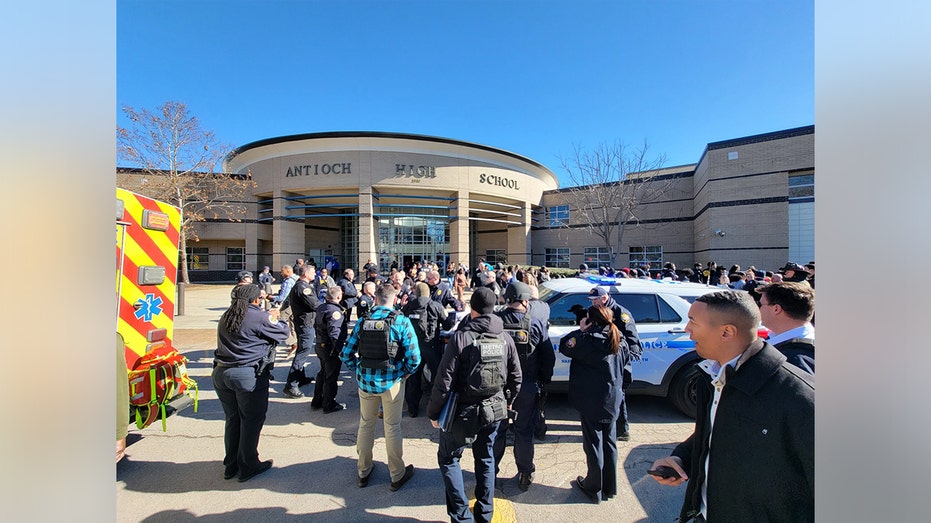A Peek Into Trump's AI Border Dystopia
President Trump's second term is underway, and this time he has a veritable toybox of tech to play with — to say nothing of the Big Tech moguls lining up for an expedited pass to a top-secret security clearance. As the world waits with bated breath to see what wild promises the US's 47th president will deliver on — like his 25% tariff on incoming goods from Canada and Mexico — it seems incoming immigrants from South America are getting a taste of things to come. Yesterday in Trump's first day back, he made good on an array of promises […]


President Donald Trump's second term is underway, and already off to a raucous start.
As the world waits with bated breath to see what wild promises the US's 47th president will deliver on — like the 25 percent tariff he's threatened on goods from Canada and Mexico — it seems that incoming immigrants from South America will be among the first targets.
On Trump's first day back, he made good on an array of promises targeting migrants, such as shutting down an app-based Biden-era visa lottery system that's stranded tens of thousands of migrants waiting for their lawful visa appointments in Mexico indefinitely — a limbo that seems likely to now be permanent.
He likewise took aim at migrants and US-born minorities on our side of the border, executing an order that effectively halts US government agencies from issuing citizenship documents to US-born individuals whose parents are not naturalized citizens. The direction also instructs heads of executive agencies to roll out new marching orders focused on aggressive immigration enforcement and deportation within 30 days, while removing key oversights on enforcement agencies like ICE.
It's all gearing up to what Trump has promised will be a national wave of mass deportations — a likely meat grinder of human cruelty, but also a formidable logistical challenge that will almost certainly forge new frontiers in surveillance tech by scrutinizing both the border and the country's population for signs of undocumented immigration.
"While AI offers vast potential to streamline operations and secure borders, its misuse — intentional or not — could lead to dangerous outcomes," United Nations AI advisor told the New York Post in a provocative feature about the Trump administration's plans to use AI in its immigration crackdown. "There’s a slippery slope where AI can be weaponized, eroding civil liberties, violating privacy, and fostering systemic bias. Under the Trump administration, the aggressive expansion of AI in border security could turn these tools into mechanisms for mass surveillance and control."
Take Kevin Cohen, the American-born tech founder behind Israeli startup RealEye, whose company is focused on AI-powered mass-surveillance and threat detection.
"We have to be smarter... and find more creative ways to make sure everybody crossing the border is who they say they are," Cohen told the Post.
"RealEye's systems analyze behavioral patterns, travel data, and communication trends to highlight areas of concern in a fact-based, automated manner," reads the company's PR Newswire copy in an eerie blend of LinkedIn-meets-Person-of-Interest startup jargon. "The technologies also support long-term monitoring and tracking, enabling proactive intervention against evolving threats."
Who's included in that definition of "evolving threats" remains to be seen. RealEye has also partnered with the military of the Philippines as well as an unnamed law enforcement entity in Israel, both of which have long histories of human rights abuses perpetuated in the name of law and border enforcement.
Israeli defense companies are prized by enforcement agencies around the world, as their weapons and surveillance tech is often "live tested" on occupied Palestinian territories before being adopted in the West, as Antony Loewenstein details in his 2023 book "The Palestine Laboratory." Deployment of such aggressive surveillance measures on American soil isn't without precedent — just think back to the NSA under Obama — but each new technical advancement in the surveillance industry will inevitably pose novel ethical and civil questions.
Chief among those concerns is the efficacy of AI in such a massive and chaotic environment as the US-Mexico border, nevermind the US writ large. The domestic rollout of AI-based facial recognition software by enforcement agencies has been a nightmare in cities like Detroit, which had to halt use of the tech after AI led to three false arrests in summer of 2024. Other horror stories abound, like a California man who was falsely accused of shoplifting by Sunglass Hut's AI-powered loss prevention software and then arrested by incredulous police.
According to reporting by the Post, the Trump administration is expected to support its AI-monitoring program with massive investments into everything from AI-powered autonomous drones to robot dogs — which are already roving Trump's Mar-a-Lago resort — and a $101 million expansion of the Department of Homeland Security's (DHS) Autonomous Surveillance Towers. This expectation is supported by analysis from The Bulletin of the Atomic Scientists — the progenitors of the Doomsday Clock — which writes that "an already multibillion-dollar border and surveillance industry is set to win big under Trump’s plans for new border enforcement spending, immigration surveillance, and mass deportation."
Those, by the way, started under Trump's predecessor Joe Biden, who was himself no immigration dove and who started many of the programs Trump will almost certainly leverage in his new crackdown.
Case in point, the DHS got a $5 million allocation during Biden's final days to develop an applied-AI office within the DHS Office of the Chief Information Officer, in addition to $127 million for border security technology at ports-of-entry, $68 million for customs and border investments in air and marine technology, and $138 million in counterterrorism detection technology and equipment, among other expenditures. For its part, ICE is budgeted for $2.5 billion for "additional personnel and technology enhancements for investigative capabilities."
The Oval Office isn't the only government body enticed by the techno-future. In September, a bipartisan bill called the "Emerging Innovative Border Technologies Act" passed through the Senate and is now waiting on a Congressional hearing. If passed, the legislation would order the DHS to "develop a plan to identify, integrate, and deploy emerging and innovative technologies to improve border security operations" — essentially writing into law the provisions which Trump's executive orders are beginning to lay out.
On a practical level, Orwellian tech-entrepreneurialism might provide law enforcement with some flashy toys to play with — not to mention lucrative contracts for Silicon Valley — but it does nothing to solve the economic issues underlying the immigration crisis, instead Band-Aiding over the systemic issues with astronomically expensive shows of force.
More on Immigration: MAGA Figures Turn on Elon Musk for Not Hating Immigrants Enough
The post A Peek Into Trump's AI Border Dystopia appeared first on Futurism.
What's Your Reaction?






























.jpg?width=1920&height=1920&fit=bounds&quality=80&format=jpg&auto=webp#)


















































